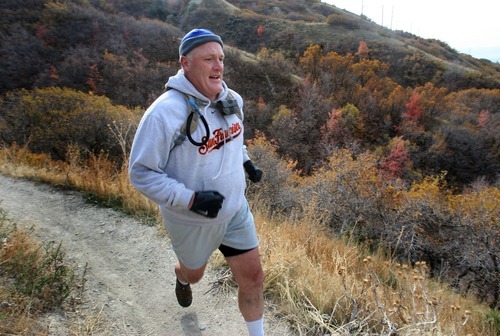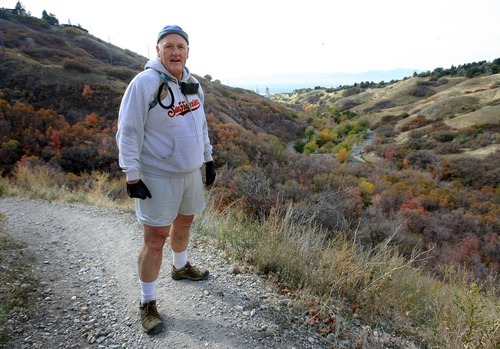This is an archived article that was published on sltrib.com in 2011, and information in the article may be outdated. It is provided only for personal research purposes and may not be reprinted.
Joseph Jarvis resolved six months ago to lose 25 pounds after a failed assault on the Grand Canyon.
He started jogging and counting calories in pursuit of a second attempt, which he accomplished in the summer.
"I make the claim that I'm the heaviest person to make it from rim to rim in one day," said the 56-year-old retired doctor, who applies the same dogged focus to bettering the nation's bloated health care system.
His decades-long push for a statewide health cooperative — a publicly funded, nonprofit health insurance trust to cover every Utahn for all medically necessary care — has been a non-starter in conservative Utah. Chances of it gaining traction grew slimmer with passage of President Barack Obama's health overhaul, which Jarvis says "sucked all the oxygen out of the room."
But if the U.S. Supreme Court rules some or all of the federal law unconstitutional this winter, as some predict, Jarvis and others like him could be free to pursue universal health care without apology.
"The pendulum has swung back to this issue over and over again," said Jarvis, citing the failed presidential reforms of Roosevelt, Nixon, Clinton and others. "Why? Because we never do the right thing. It'll come back and when it does we'll ride that wave of interest."
Jarvis' own interest is personal and professional, born from treating low-income, uninsured patients as a University of Utah-trained family doctor and a stint as Nevada's public health officer overseeing communicable disease control and hospital regulation.
Witnessing firsthand how a knot of profit-centered special interests is "hurting the economy, bankrupting families and killing patients," he set about finding a better, cheaper and more equitable way to deliver health care.
Recounting an "aha" moment, Jarvis tells how the Nevada Legislature created a system for designating hospitals as trauma centers.
The best hospital in town refused to apply and when Jarvis asked why, he said the hospital CEO replied, "Because you included in your designation a requirement that we take everybody. We can't do that. We are in the business of making money."
—
Evolution of a thinker • Jarvis is not a household name. But in health policy circles, there's no escaping him.
"Single-payer Jarvis? He's a good guy, a good thinker. He keeps the other perspective alive," said Rod Betit, CEO of the Utah Hospital Association.
Jarvis has been crusading since the early '90s, when Betit headed Utah's Department of Health.
Seeking a bully pulpit for his cause, Jarvis has forged alliances with low-income advocates, run unsuccessfully for the Legislature, and lobbied to fill Betit's old post.
"I've given several governors the opportunity, and they've turned it down," said Jarvis. "I'm too controversial."
Betit says Jarvis is unwavering in his goal, but "has gotten better at couching it in politically acceptable terms."
Single-payer means different things to different people. The model promoted by Jarvis, a Republican, has a distinctly free-market flavor.
Hospitals would remain private. But a single, nonprofit health cooperative supplying guaranteed coverage to all Utahns would take the place of commercial insurance.
People would still pay for coverage, but it would be subsidized and kept affordable by eliminating insurance middle men and simplifying payments.
Jarvis' plan calls for creation of a commission to squelch overuse: unnecessary tests and procedures ordered by doctors required to meet productivity targets or to fend off malpractice lawsuits. The commission, composed of medical experts, would determine which services are covered for given conditions based on research. It would also hear malpractice claims and insurance appeals.
It can be done, Jarvis says, for less than the $15 billion Utah already spends on health care, most of which flows to Medicaid, Medicare and health coverage for veterans and government employees.
—
Change is elusive • Today, Jarvis is no closer to realizing his vision.
For now, he is content to bide his time, fine-tuning his proposal for placement one day before voters. He blogs incessantly to raise awareness when not consulting on disease cluster investigations and workers' compensation claims.
"People worry about government-funded health care and loss of choice," Betit said. "The country is not ready for it."
Doctors, too, dislike government telling them how to practice medicine and dictating how much they'll be paid, said Michelle McOmber, executive vice president of the Utah Medical Association.
But the association, and other groups in Utah, are considering applying for federal grants to start their own health co-ops.
Meanwhile, universal care proposals are moving through legislatures in Minnesota, New Mexico and Colorado, fueled by consumer angst over exorbitant hospital bills and insurance premiums.
"Vermont passed a cover-everybody plan, although it's not perfect, and Massachusetts has 98.5 percent coverage. So why not Utah, a state with a strong religious heritage of caring for your neighbor?" says journalist T.R. Reid, author of The Healing of America, a best-selling book on the health systems of industrialized nations. "It's more likely to happen state-by-state, as it did in some of the countries in my book."
Jarvis has long insisted that health care is a local concern, an argument gaining favor amid the fervor over states' rights — and from surprising corners.
"We can do this, not at the federal level, or state level, but locally," says former state insurance commissioner Kent Michie.
The 67-year-old retired investment banker and political appointee under former Republican Gov. Jon Huntsman remembers a time when health spending was 4 percent of the U.S. gross domestic product. Now it exceeds 17 percent.
"Those are killer numbers. They're wipe-out numbers," said Michie.
If Jarvis envisions a co-op being run by a nonprofit, like the Public Employee Health Plan for public employees, Michie sees it looking like a water or sewer district.
"We trust government to give us clean water and handle our sewage," he said. "Why wouldn't we trust a special health district, a public trust, to pay our medical bills? It would be more efficient."
Getting there, he concedes, will take serious thinking by people capable of seeing beyond the socialist label.
"I have always trusted Utahns, when presented with the facts in an unemotional way, to do the right thing," Michie said. "I hope it doesn't take a financial collapse for us to figure it out."
More online
Learn more about Joe Jarvis' health care initiative • http://www.utahhealthcareinitiative.com —
Where American health care falls short
20,000 citizens die each year from treatable medical problems because they don't have health insurance.
23 million are uninsured.
The country spends more on health care than any other developed nation, despite lower rates of doctor visits and hospitalizations.
The U.S. has some of the best cancer survival rates but ranks 27th in life expectancy at birth. We have the highest rate of obesity and second worst rate of adult diabetes.
98,000 people die each year from hospital-acquired infections, wrong-site surgeries and other harms, making medical errors the fifth leading cause of death in the U.S.
Sources • Organization for Economic Co-operation and Development, Institute of Medicine, and T.R. Reid's "The Healing of America."







